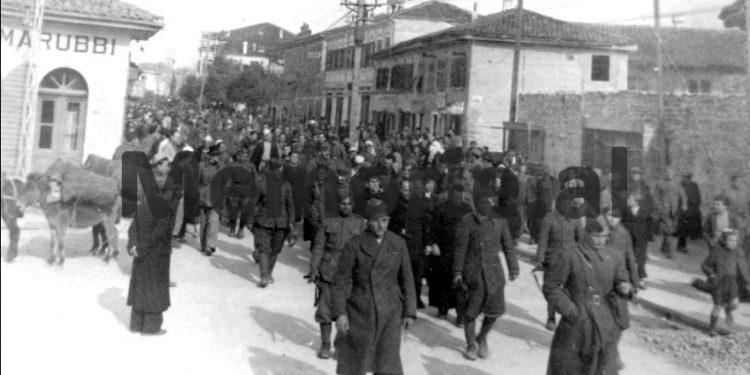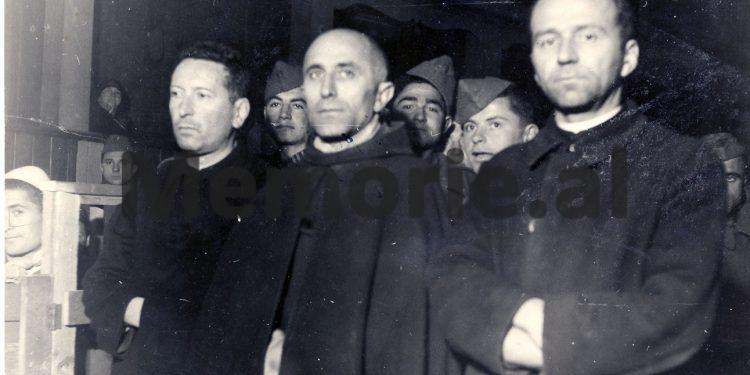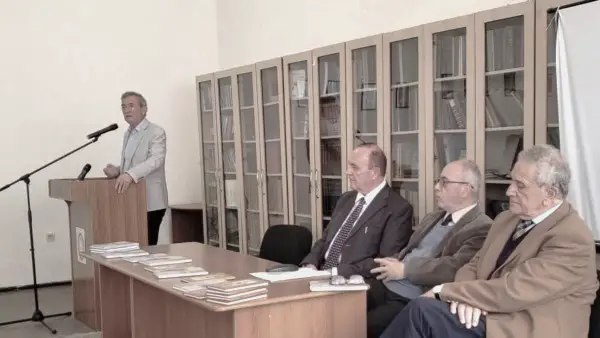From Shpendi TOPOLLAJ
Memorie.al / For the historical contribution to preserve and further develop the high patriotic, cultural, artistic and educational values, for the outstanding figures in every field that he produced over the centuries from the period of the reign of Teuta, Agron and Ghent to the new times, perhaps Shkodra, with its noble and hospitable people, has deserved more than any other city of Albania the dignified treatment, after the liberation of the country. But precisely with this city, in the wake of the injustices that the communist system had in its nature, the greatest paradox appeared; he was despised, always viewed with suspicion, and subjected to violence, reprisals, and savage, unrelenting class warfare.
The people of this city experienced, like no other, apart from poverty, horrors unheard of before: shootings, hangings, imprisonment, torture, deportations, expropriations, seizures and humiliations, among the most incredible. Named intellectuals, wealthy families, clergy of all religions, and anyone who manifested the slightest disagreement with the despotic order being installed were targeted.
The amazing beauty of this city, where it was combined like nowhere else, the miracle of the lake, rivers, hills, fields, forests and mountains, the magic of the legends that came down from that magnificent castle, the sounds of the music of those years that would surprise even Verdi, Puccini of Maskanjin itself, the pure and sweet speech of its inhabitants, their clothes that even the famous painters of the renaissance would envy, surprisingly never softened the irrational anger of the communist ignorants.
They, with their security agencies, instilled fear into the mother’s womb in the big and small, without knowing any mercy for the innocent and the defenseless. They were happy when they were charged with the inhumane task of returning the wall of the Rrmaj cemetery from the side of Cyrus, painted with the blood of those killed without trial, to the “Pere Lachaise” of the Communards of Paris during the Third Republic (May 21, 1871). This was the main reason that the revolt for the overthrow of that system started right here, where the revenge continued even in the last moments, killing four boys who were looking for freedom and democracy. In short, Shkodra suffered.
This is how the Albanian author residing in Germany, dentist Mark Zadeja, has named his book. Plato, whose real name was Aristokles, said it simply and beautifully that; “This city is what it is, because the citizens are who they are.” Mark also wanted to explain this with the book he wrote. At this age that I am and I remember the childhood years that I spent in Shkodër, I realize that that city was a world of its own. A world that, with its imposed silence, spoke volumes. And here, my esteemed peer, the academic, Mark Zadeja, has discovered this quite well.
Moreover, having a tendency to study philosophy with passion, he has chosen to philosophically analyze the weapon with which the wise people of Shkodra preserved intact its character formed over the centuries, and not to fall into the trap of creation of the “new man”, which the party-state proclaimed the most. Knowing the great role and influence that the Catholic Clergy of Shkodra has had, in the cultivation of human values, I have chosen a quote from the professor of the Church of Christ, Leroy Brownlow, who wrote: “There are moments, when silence echoes more powerfully, than everything else”.
And everyone knows that it, including those barcalets articulated in a half-voice as part of it, have been the distinguishing features of the Shkodran opposition to communist dogmas and deeds. Silence was the common denominator of those people; who every time they met and saw eye to eye, they could barely contain that ironic laugh. Seen this way, Mr. Mark Zadeja’s book analyzes that situation of suffering that lasted almost half a century, according to a previously unknown perspective. He himself says that; “In silence, the soul has kept the secret, but now it boldly asserts itself, revealing the truth.”
For its part, silence, being the most reliable archive of memory, never betrays you. So the author continues: “Trying to refresh the memory, I am writing something with all the feeling of the soul, the strength of the will for what I feel best about the truth, the right, but never forgetting that little light that comes from ‘Up’ , only for my city, what I have always suffered. I dreamed that maybe one day the time will come to show, to show what I experienced about the city where I was born, the city of suffering, SHKODRA”.
And his whole story is nothing more than a hymn of resistance for those who deserve his words that “The human spirit that loves Freedom, never agrees with the dictatorship that was destructive for a people, for Albanian art and culture” . This system, and especially the dictator who was never satisfied with the youth blood of the people, ensured, as the author says, his existence with his loyal creature, the so-called; “insurance”. Woe to him who had business with them.
Human life in their eyes had lost its meaning. Intimidation of the masses and their slavish subjugation were worth it, to fill the prisons where beastly labor awaited them. Today, everyone knows these that are why Mark doesn’t bother to count them. Many have written about them, such as: Arshi Pipa, Father Zef Pllumi, Uran Kalakulla, Visar Zhiti, Fatos Lubonja, Pjetër Arbnori, Spartak Ngjela, Maks Velo, and many other prisoners of conscience, or completely innocent, with the confessions of their sad
Mark, for his part, makes a spiritual analysis, discovers the phenomena that resemble his subconscious, studies how far patience leads and how a person can remain human again in front of these tyrants and forgive, not take revenge on those who brought him so much misery . He does this more in the form of essays than stories. And above all, he emphasizes how his city managed, with his hidden voice, “with his tears, to unite people, without any difference of religion or idea”. It was this, that miracle that made this city survive and make itself proud: “I LOVE SHKODRA, MORE THAN MY LIFE…”!
But the psychological breakdown on the part of this author did not escape even the blows of the clergy, the screams of solidarity with the unjust decisions of the servants of the regime, espionage, copying Chinese works, laborious actions, the curse of everything called capitalist, the servility of the hosanna writers , the bravado of the ignorant, who called themselves communists, without knowing what communism is and who were called such, thanks to a leaflet that said; “party member”, up to the concern about the evils that are appearing today in democracy, where the Marxists of the past have turned into pashalars with beards and where immigration has not stopped.
Mark, in the composition of the book, has also alternated some of his poems, in accordance with what he will present in the sequel, which, with their break, give it beauty and serve as illustrations for the chapters that follow. Based on the aspirations of the people of Shkodra, that in freedom it will be better, in his honesty, in his civic concern, which is not shared even where he has lived for a long time, Mark closes the book with some orders and advice, where unintentionally, there are doses of naive faith and belief in them, and God as a conductor’s baton, will change our world for the better.
Ah! If only it were so. What remains important is what he elaborates throughout the content of this book i.e. that in moments when the dictatorship tears with its nails, silence is also the tool that disapproves of it, opposes it or warns of the end of that regime. It is like that, because not for nothing the American humorist, Josh Billings, once he became serious, said: “Silence is one of the most difficult arguments to refute.” But also the book “City of Suffering”, by Mr. Mark Zadeja, can hardly be refuted. Memorie.al















